An Open Letter to the New York Times
I sent this letter about the “both sides” game to the New York Times, but I doubt The Times will publish it. I do think it’s important to cover the subject on History Think, for it holds significant insights about the past and our evaluation of it.
Dear New York Times Editors,
I just listened to Lulu Garcia-Navarro’s interview with Israeli opposition leader Yair Lapid, published on April 27, and similar to much of the coverage of Israel, I found it disappointing. Before getting into the specifics of this interview, allow me to set the stage with some other examples of the “both sides” game and some thoughts on how pernicious it is for the news media to practice this methodology.
I first noticed this problem as a kid, watching 60 Minutes with my parents. Every show would end with a brief mention of the letters they received about the previous week’s episode. I may be wrong to overgeneralize, but I can honestly say that I cannot remember any time they read anything of substance from these letters. Instead, they would repeatedly grab two or so letters and quote a few lines, or just a single line that basically amounted to, “Your coverage of X was so biased in their favor that it made me sick,” and, from the other side, “Your coverage of X was so slanted against them that I can never trust you again.” This gave the impression that 60 Minutes was doing a good job, since extremists on either end of the issue found things to complain about. But it gave the viewers no sense of what any of the letter writers actually said. Did either side have any valid points? Did either side simply resort to anger without any appeal to reason? Had 60 Minutes actually failed to cover this in an appropriate manner? Who can say? What I can say is that this self-serving approach to their very selective quotations was buttressed by the underlying assumption that the news should cover “both sides” in a manner to offend those most passionate about this issue. That this “balanced” approach is a hallmark of professional news coverage. And that assumption is wrong.
In Gerald Seymour’s 1976 novel, “Harry’s Game,” about the IRA and the complexities of the conflict in Northern Ireland, he coined a phrase that has become an unquestioned maxim for millions: “One man’s terrorist is another man’s freedom fighter.” I saw it directly repeated and often reflected in both my undergraduate and graduate studies, by students and faculty alike, and I am certain it is a popular sentiment on the campuses where protests against Israel are currently underway. But such a blanket statement is a dismissal of morality, not a clarification. Yes, I have seen many situations where the lines between conflicting parties are difficult to draw, and reasonable people can reasonably disagree on many points. I can also imagine a great many hypotheticals where clear answers will forever remain elusive. But that does not prove that the only distinction between a “terrorist” and a “freedom fighter” is your personal perspective. It does not mean that “both sides” should be assumed to be equally right and equally wrong from the outset, with no hope of drawing any rational lines beyond your personal feelings. To state, as if it were a universal principle, that, “One man’s terrorist is another man’s freedom fighter,” is no better than insisting that, “One man’s rapist is another man’s thoughtful lover.” It is not only irrational, it is profoundly offensive. Unfortunately, this appears to be the attitude of the majority in the news media. They are simply here to tell you who says “terrorist” and who says “freedom fighter,” with no assessment or judgments getting in the way. They are leaving it up to individual audience members to decide on these things for themselves, but they have already done the audience a grave disservice by pretending they cannot sift through the facts in a meaningful way. If they cannot do this, how can we be expected to do it, when all we have to go on is an artificially “balanced” summary?
Sometime before Donald Trump announced his candidacy for the 2016 election, one of his most pathologically distrustful friends and supporters, Roger Stone, appeared on NPR as a political expert to discuss the possibility of Trump entering the race. NPR was upfront about the fact that Stone was pro-Trump, but that was the only qualifier they gave about him. Otherwise, he was presented as a knowledgeable insider who had worked for many Republican candidates. I sent a note to NPR through their app and tried to explain what a disservice this was to their listeners. The fact that Stone was known for questionable morality and “dirty tricks” was certainly worth mentioning. More importantly, the fact that Stone has profited by peddling conspiracy theories should be a disqualification from having him on as an expert. At the very least, it should call for a very different introduction about who he is and what he stands for. I do not recall if I mentioned my personal history with Stone, who once threatened, via Twitter post, to come to my home state of Minnesota and “punish” me, “for your lies – you won’t be hard to find – see you soon.” What “lies” had I told? I had correctly pointed out that Stone’s book, “The Man Who Killed Kennedy: The Case Against LBJ,” which claimed President Johnson had President Kennedy murdered, was full of recycled falsehoods and long-disproved misconceptions. Regardless of how many details I shared with NPR, the message I received in response was extremely condescending. They explained to me that NPR prides themselves on presenting a wide range of viewpoints and how it is necessary to do this, in order to fulfill their duty to serve the public and present the news. In other words, they made me into the bad guy, who is intolerant of hearing anything I disagree with, allowing themselves to play the good guy, who is offering “both sides” for the benefit of the public. I tried once more to get through to them, asking, “Would you have a Holocaust denier on and simply present them as a history expert or a historian?” I also believe I said something to the effect of, “When you choose to have an “expert” on who has a long history of dishonesty and pushing counterfactual narratives, don’t you think you have any responsibilities to the public to cite these things? How are you serving the public by having people on, regardless of their politics, and presenting them as thoughtful “experts” when they are known liars? I only received a short reply saying my thoughts would be passed on to NPR management or some such higher-ups. More likely, my thoughts were dropped into the memory hole and the person/people who replied to me continued to feel superior to me, since I refused to see, “both sides.”
At one point in Garcia-Navarro’s interview with Lapid, she said:
“As we’ve been talking, what I’ve heard is, as it comes to the war, there’s really not a lot of opposition at all. Israel is being accused of genocide, of war crimes. And as we’ve talked, you’ve defended the conduct of the war. And you’ve referred to yourself as an Israeli patriot. But I suppose my question is: Can patriotism not also be defined as questioning the conduct of this war?”
Lapid answers, without hesitation, “Of course it can,” but I was left wondering why the question was even asked? It made it seem that Lapid was somehow failing as an Israeli opposition leader, because he was not against the war. It made it seem as if he had argued that being pro-war, every war, was the only possible patriotic position, which is nowhere near accurate. I suspect that Garcia-Navarro had a need to find fault with what Lapid was saying and she was going to do this, even if she had to make it up. There also appears to be an assumption that because, “Israel is being accused of genocide, of war crimes,” Lapid was under some obligation to stand with the accusers. There is certainly something, “curiouser and curiouser,” about her reasoning when you drill down into it. And then there is the “both side” question. When Lapid tried to explain the history of how the Israelis have tried to solve this and Palestinians have not been a partner for peace, he appealed to the fact that Garcia-Navarro had covered the conflict for many years, saying, “then you know, unlike others, the numerous times now that Israel has offered the Palestinians statehood, and they refused again and again and again and again.” Garcia-Navarro could not bring herself to acknowledge this in any way. Instead, she retreated to the “both sides” line, saying, “But, you know, there’s another version of this story.” I was happy to see that Lapid did not let this stand, explaining, “Yeah, there is another version of this story, but it’s not the right one. And I was involved, so I know.”
Garcia-Navarro never offers anything to justify the idea that the sides here are equal or to suggest that Lapid’s version of history is incorrect. Correct and incorrect, factual or not factual, do not seem to play a role in her approach to the subject, as they do not play a role for many journalists and many more student protestors. Everyone just has a, “version of this story,” which they are here to cover or take sides with, but not to wrestle with in an intellectually honest manner. I agree with Lapid that there appears to be a, “betrayal of intellectuals” here. “[T]he intellectuals of the West, or some of them, have betrayed the idea of complexity.” Instead, they reduce the matter to fit their worldview. A worldview that is too often anti-Jews, although they call it anti-Israel or anti-Zionism. Lapid tried to come to terms with this reality in the interview and you can feel the anguish in his voice as he does it:
“I cannot seem to put my mind around the fact that five minutes after the worst massacre of Jews since the Holocaust, we are already defending ourselves from people who are telling us, Well, we question your right to defend yourself, because you are part of the white privileged world and therefore you are not entitled to self-defense. It doesn’t make sense to me.”
He goes on to explain why he is glad that his father, a Holocaust survivor, is not here to see this:
“His entire life was the way out of the basement in the Budapest ghetto, which the Nazis put him in. And if he was alive now, he would be locked with me and my daughter with special needs in the basement of my house, because somebody is trying to kill us again. The fact that we do not seem to be able to rescue ourselves from being locked in a basement surrounded by people who want to kill us is pretty, pretty frustrating for the people of Israel.”
At which point I am certain Palestinian supporters will likely give themselves whiplash by jerking their knees so fast and jumping in with something like, “The 30,000 Palestinians killed in Gaza wish they had a basement to hide in!” Which is likely true. As it was true for the hundreds of thousands of German and Japanese and Italian and French and other civilians that the United States killed in their efforts to eradicate the Axis Powers, while losing an infinitesimally small amount of our own civilians. But numbers are not the way to understand this conflict, as they are not the way to understand the Second World War. There is a profound and irreconcilable difference between a democratic society, which struggles to operate under the rule of law, as the United States and Israel do, and criminal organizations like the Nazis and Hezbollah, which glorify violence — typically the more sadistic the better — and fight for a day when their power will be unquestionable and all the Jews will be dead. But why begin our examination of history with such unpleasant facts when we can play the “both sides” game?
George Orwell once reportedly joked, “Some ideas are so stupid that only intellectuals believe them.” I, and I believe Mr. Lapid, would agree. It’s not that being an intellectual is a bad thing, but using that intellect to twist reality into something it is not, is a very bad thing. Orwell experienced this in a dramatic way for many years before he died. A committed socialist, Orwell nevertheless refused to hop on the Soviet bandwagon, with the vast majority of his fellow left of center intellectuals. Worse still, he dared to tell the truth about the horrors of Stalin’s rule and the fundamentally flawed nature of the Soviet Union. For this, he became an outcast. Former friends and admirers wanted nothing to do with him, because they did not want to face the reality of the evil they had bought into. There will come a day when the students chanting, “From the river to the sea” — calling for the genocide of the Jews, whether they wish to admit it or not — will likely be seen as the useful idiots who supported the USSR are now widely seen. As an embarrassment. But I am doubtful that future generations will learn anything from this. They will have their own useful idiots, their own intellectuals spouting off profoundly stupid ideas. And the news media will be right there, ready to cover “both sides” of the matter; presuming equality, whether or not it is proven to be otherwise.
Thank you for your consideration of this,
James K. Lambert



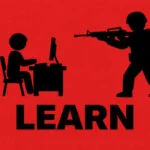

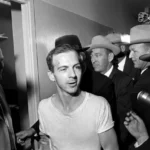
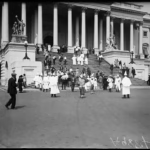

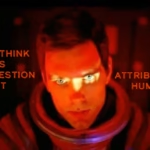
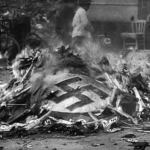
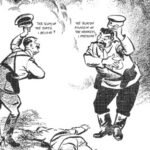


Leave a Reply